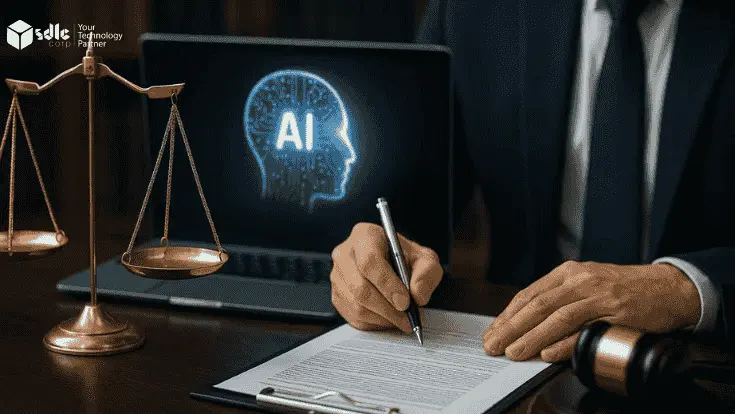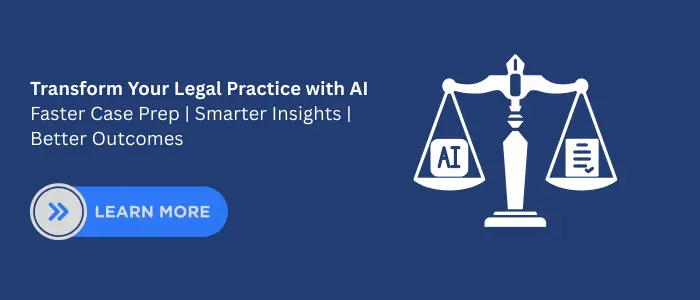Introduction
Law firms and legal departments today face growing pressure to handle heavier caseloads, manage large volumes of documents, and meet client expectations for faster results. Traditional methods of case preparation and legal research often take weeks, consuming valuable time and resources that could be spent on strategy and client relationships.
Artificial intelligence is changing that reality. AI for Legal Industry is helping lawyers analyze documents in minutes, uncover critical insights, and streamline litigation preparation. Rather than replacing legal professionals, it gives them more freedom to focus on arguments, negotiations, and delivering better outcomes for their clients.
1.Current Challenges in Legal Practice
Despite advancements in technology, many legal professionals still spend a significant amount of time on repetitive and manual work. Reviewing hundreds or even thousands of documents, cross-checking evidence, and preparing case files can take weeks. This not only slows down case progress but also increases costs for clients.
Another major challenge is the complexity of modern cases. Corporate disputes, contract breaches, and personal injury claims often involve multiple parties, large datasets, and conflicting evidence. Lawyers must carefully analyze every detail, and any oversight could weaken their argument in court.
Collaboration can also be difficult when teams work across different departments or locations. Miscommunication or delays in sharing information can create gaps in strategy and case preparation. These challenges make it clear why law firms are turning to smarter solutions. AI for Legal Industry is emerging as the tool that addresses these obstacles and helps legal teams work more efficiently.

2. How AI for Legal Industry Transforms Legal Workflows
The legal process involves countless tasks that demand accuracy, speed, and collaboration. From reviewing documents to managing deadlines, even small inefficiencies can slow down entire cases. AI for Legal Industry is changing this reality by streamlining workflows at every stage. It helps lawyers move beyond repetitive tasks and focus on strategy, client relationships, and winning stronger cases.
2.1 Case Document Analysis and Discovery
One of the most time-consuming tasks for any legal team is reviewing case documents. AI tools can analyze thousands of pages in hours, extracting the most relevant details and organizing them for quick access. This allows attorneys to identify key evidence and prepare stronger cases much faster. By automating discovery, AI for Legal Industry reduces errors, saves time, and ensures nothing critical is overlooked.
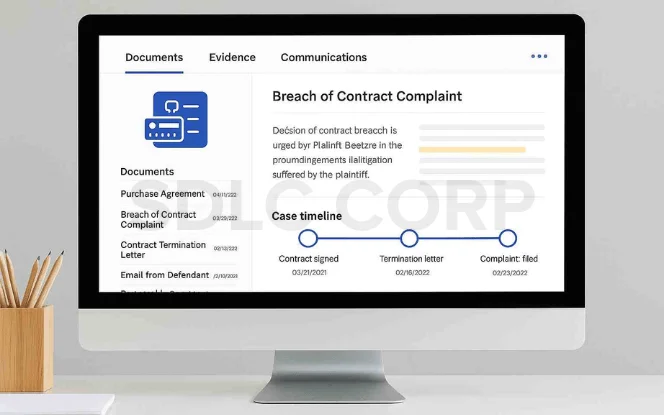
Key Points:
- Rapid review of large document sets
- Identification of critical evidence
- Creation of comprehensive case timelines
2.2 Visual Case Storytelling
Court cases often involve complex evidence that can overwhelm juries and judges. AI tools help lawyers create clear timelines, charts, and visual narratives that transform complex details into compelling stories. This improves the chances of persuading the court with clarity and impact.
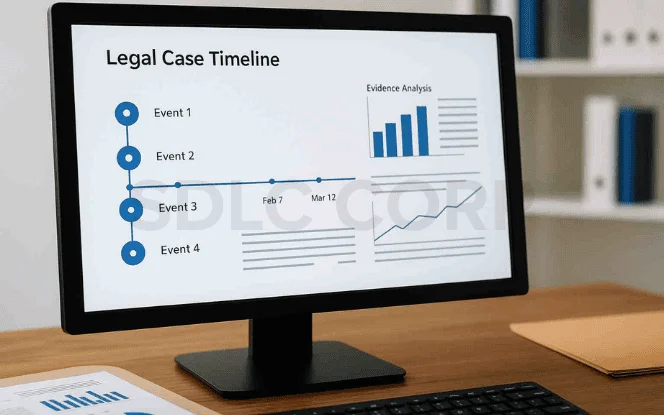
Key Points:
- Converts complex data into clear visuals
- Builds chronological case timelines
- Makes arguments more persuasive and engaging
2.3 Collaborative Litigation Workspace
Legal cases usually involve multiple team members working across departments or offices. AI-powered workspaces allow attorneys, paralegals, and staff to collaborate in real time. Shared access to documents and updates keeps everyone aligned, reducing delays and miscommunication.
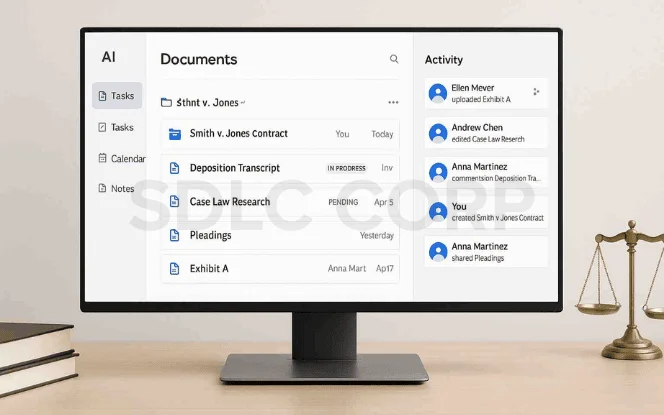
Key Points:
- Shared case workspaces for teams
- Real-time document updates and edits
- Improved communication and efficiency
2.4 Legal Brief and Motion Generation
Drafting motions and legal briefs is one of the most repetitive tasks in law. AI makes it easier by suggesting drafts based on case law, evidence, and prior documents. Lawyers can then refine these drafts, saving valuable time and improving consistency across filings.
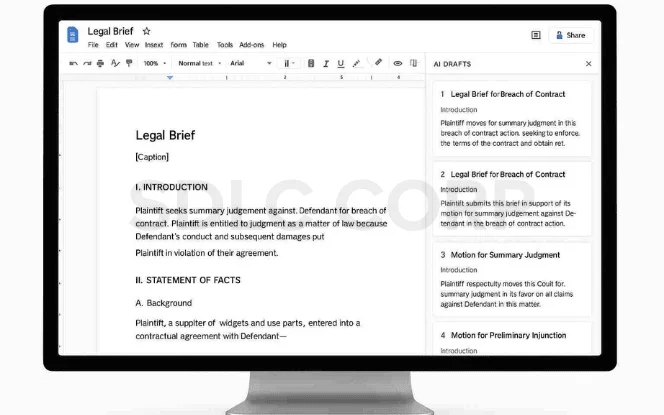
Key Points:
- AI-assisted drafting of briefs and motions
- Integration of relevant case law and precedents
- Reduced repetitive work for attorneys
2.5 Case Progress Tracking and Management
Managing multiple cases means tracking deadlines, hearings, and filings. AI tools provide automated reminders, status updates, and progress reports to ensure nothing is overlooked. This creates a smoother litigation process and reduces the risk of missed deadlines.
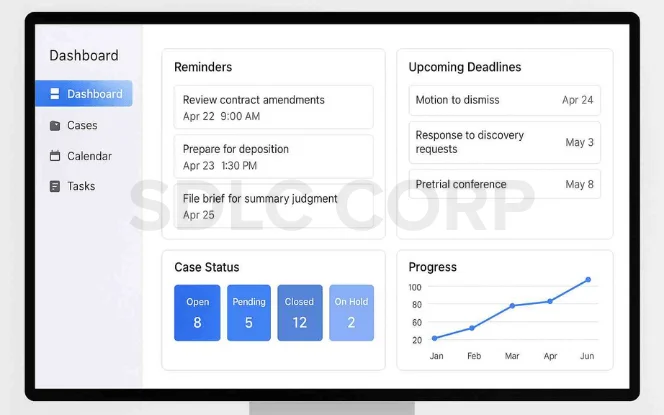
Key Points:
- Automated deadline tracking
- Intelligent reminders and alerts
- Real-time case status updates
3. Practice Area–Specific AI Solutions
Every area of law comes with its own challenges, whether it’s managing complex corporate disputes, reviewing lengthy contracts, or analyzing medical records in personal injury cases. AI for Legal Industry provides tailored solutions that address the unique needs of each practice area. By adapting to different legal specialties, AI helps firms work smarter, handle more cases, and deliver better outcomes for their clients.
3.1 Corporate Litigation
Corporate disputes often involve massive amounts of contracts, financial records, and communications. Manually reviewing these documents is slow and prone to oversight. With AI for Legal Industry, lawyers can quickly identify crucial evidence, analyze case strengths, and uncover hidden connections between documents. This allows firms to build stronger narratives and prepare more persuasive arguments, giving them a competitive edge in complex litigation.

3.2 Contract Dispute Analysis
Contract disputes are common, but analyzing every clause and identifying potential breaches can take weeks. AI speeds up this process by reviewing contracts, detecting inconsistencies, and comparing terms with legal precedents. By spotting risks early, attorneys can design more effective strategies to resolve disputes. This helps protect clients while reducing the time and cost associated with lengthy contract battles.
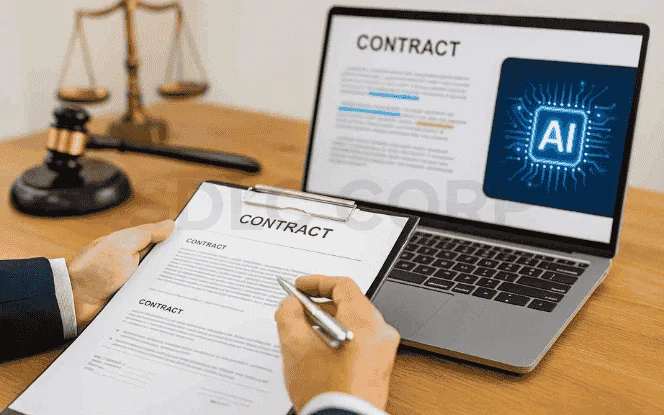
3.3 Discovery Management
Discovery is one of the most resource-heavy stages of litigation. Sorting through emails, records, and digital evidence requires enormous effort. AI-powered tools make discovery faster by assigning relevance scores, identifying privileged material, and filtering out unnecessary documents. This ensures legal teams focus only on the information that truly matters, saving both time and money.
3.3 Personal Injury Law
Personal injury cases depend heavily on medical records and incident timelines. AI assists by analyzing medical documents with high accuracy, identifying injury patterns, and linking them to treatment records. It can also reconstruct timelines from witness statements, reports, and evidence. This makes it easier for attorneys to present a clear case, maximize settlement value, and deliver better outcomes for clients.
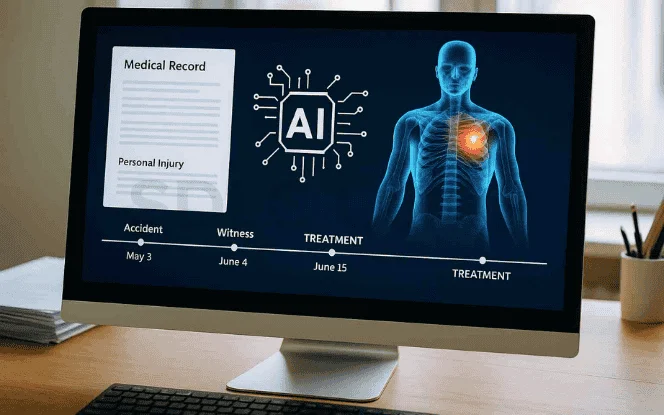
4.Benefits of AI in Legal Practice
The adoption of AI for Legal Industry brings measurable benefits that go far beyond saving time. One of the most important advantages is speed. What once took weeks such as document review or discovery can now be completed in days or even hours. This not only helps law firms handle more cases but also allows them to respond faster to client needs.
Another major benefit is accuracy. Human review can miss critical details, especially when dealing with large amounts of data. AI tools reduce this risk by analyzing information systematically and flagging essential evidence. This leads to stronger case strategies and fewer mistakes.
Cost efficiency is also a key factor. Automating repetitive tasks means law firms can reduce billable hours spent on routine work, making services more affordable and attractive to clients.Finally, AI improves client satisfaction. When cases are managed more effectively, clients see better results and gain confidence in their legal representation.
5. Real-World Success Stories of AI for Legal Industry

Law firms of all sizes are already seeing the impact of AI in their daily practice. A mid-sized corporate litigation firm, for example, integrated AI-powered discovery tools into its workflow. What once took nearly three weeks of manual review was reduced to just four days. This efficiency allowed the attorneys to focus on building a stronger legal strategy, which ultimately led to a favorable settlement for their client.
In another case, a personal injury law firm adopted AI solutions for medical record analysis. By automating the review of complex treatment histories, the firm identified critical patterns that had previously gone unnoticed. As a result, they presented a stronger case in court and secured higher compensation for their client.
Even smaller firms are benefiting. One boutique practice used AI-driven contract analysis to handle multiple disputes at once, something that would have been impossible with traditional methods. This not only improved client outcomes but also expanded the firm’s capacity to take on more cases.
6. Ethical and Practical Considerations of AI in Legal Practice
While the benefits of AI for Legal Industry are clear, legal professionals must also consider the ethical and practical challenges that come with its use. One major concern is data privacy. Law firms handle sensitive client information, and ensuring that AI systems protect this data is critical for maintaining trust and compliance.
Another important issue is bias. AI tools learn from historical data, and if that data contains bias, the results may also reflect it. Lawyers must remain vigilant, reviewing AI outputs carefully and applying human judgment before making legal decisions.
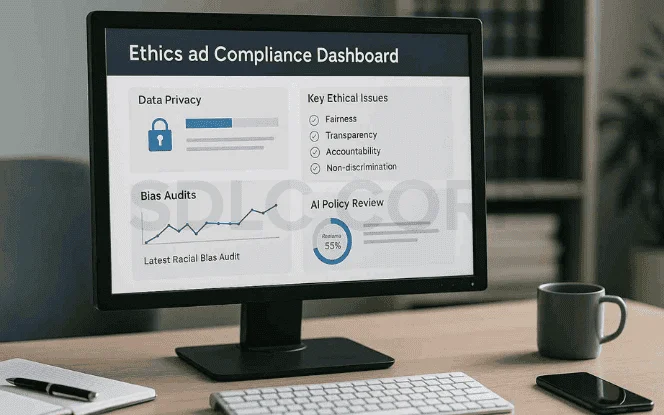
There is also the question of accountability. When AI is used to assist in drafting documents or analyzing evidence, attorneys remain responsible for the outcomes. This means firms must create clear guidelines for how AI is applied and ensure proper oversight at every stage.
By addressing these concerns, law firms can use AI responsibly while still benefiting from its efficiency and accuracy.
7. The Future of AI for Legal Industry
The future of AI for Legal Industry looks promising as technology continues to evolve. One of the most exciting developments is predictive analytics. By analyzing historical case outcomes and patterns, AI can help lawyers estimate the likelihood of success in litigation. This allows firms to guide clients with greater confidence and make more informed decisions.
Another emerging trend is the use of conversational AI for client communication. Chatbots and virtual assistants can answer basic legal questions, schedule appointments, and provide updates, freeing lawyers to focus on more complex tasks. This improves client experience while reducing delays.
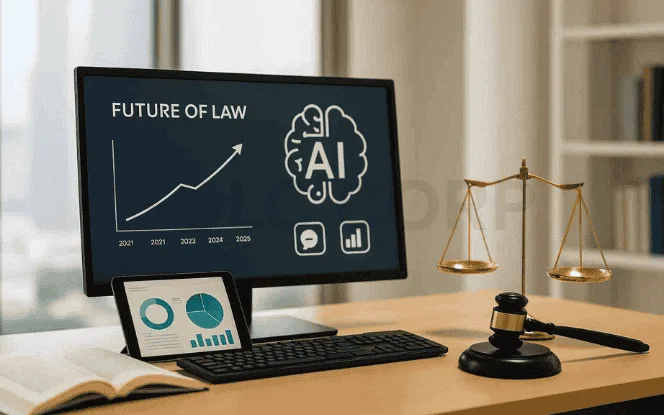
Looking ahead, the most effective legal practices will be those that adopt a hybrid model. In this future, AI handles repetitive and data-heavy tasks, while lawyers focus on advocacy, strategy, and building trust with clients. Rather than replacing professionals, AI will remain a powerful partner that elevates the entire legal process.
Conclusion
The legal profession is undergoing a transformation. As cases become more complex and clients demand faster results, traditional methods alone are no longer enough. AI for Legal Industry offers a solution by reducing review times, improving accuracy, and empowering legal teams to deliver stronger outcomes.
The firms that embrace AI today are already seeing the benefits greater efficiency, higher client satisfaction, and stronger case strategies. Those that wait risk falling behind in a rapidly changing industry.
Now is the time for law firms to explore AI-powered solutions, adopt them into their workflows, and prepare for a future where technology and legal expertise work hand in hand.
FAQ'S
How is AI used in the legal industry?
AI for Legal Industry is applied across multiple stages of legal work. It accelerates document review by scanning thousands of files to highlight key details. In contract analysis, it detects inconsistencies, risky clauses, or breaches within minutes. AI also streamlines case discovery by ranking relevant evidence and filtering privileged information. For litigation preparation, it assists in drafting briefs, motions, and visual case timelines. Additionally, predictive analytics allow lawyers to assess the likely outcomes of cases based on historical data.
Will AI replace lawyers?
No. AI for Legal Industry is designed to support, not replace legal professionals. It automates repetitive, time-consuming tasks such as discovery, contract review, or research. However, strategic decision-making, courtroom advocacy, and client counseling require human expertise, empathy, and judgment. Instead of replacing lawyers, AI enhances their capabilities, allowing them to spend more time on high-value work like case strategy and client relationships.
What are the main benefits of AI in law firms?
The benefits of AI for Legal Industry are both operational and client-focused. Firms experience faster case preparation, saving weeks of manual review. AI improves accuracy by minimizing human oversight errors and highlighting critical evidence. It also drives cost efficiency, reducing billable hours spent on routine tasks. Most importantly, it enhances client satisfaction, as cases are managed more effectively and outcomes improve.
Is AI safe to use in legal practice?
Yes, when implemented properly. Most AI platforms used in law follow strict compliance and data security standards to protect sensitive information. However, lawyers must ensure that AI tools meet privacy regulations such as GDPR or HIPAA (for medical-related cases). Human oversight remains crucial, since attorneys are ultimately responsible for validating AI-generated insights before relying on them in litigation or negotiations.
Which legal areas benefit most from AI?
Several practice areas are already seeing significant results. Corporate litigation benefits from faster evidence analysis and narrative building. Contract disputes are simplified through automated contract review and precedent matching. Discovery management is streamlined with AI’s ability to rank relevance and detect privileged information. In personal injury law, AI assists with medical record analysis and incident timeline reconstruction, making case preparation more precise and persuasive.

